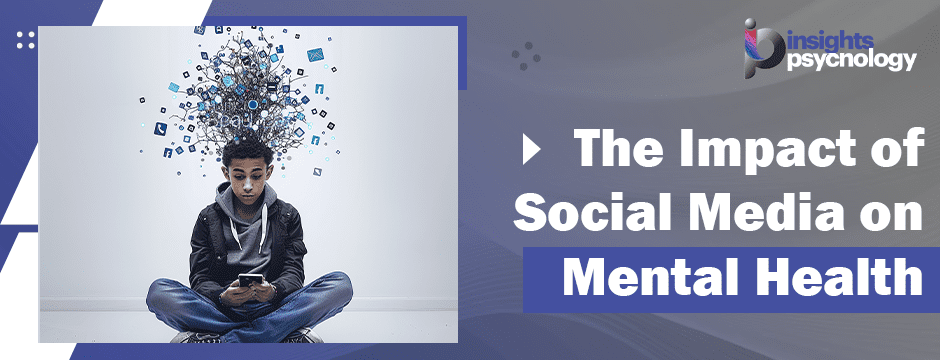In today’s digital age, social media has become an integral part of our daily lives. Whether scrolling through Instagram or keeping up with friends on Facebook, these platforms offer countless ways to stay connected, informed, and entertained. However, while social media has revolutionized the way we interact, it has also raised concerns about its impact on mental health.
With rising levels of anxiety, depression, and feelings of inadequacy, many are questioning the long-term effects of social media on mental well-being. On the flip side, when used mindfully, social media can provide support, information, and empowerment. This article explores the dual-edged nature of social media, its psychological effects, and how we can engage with it in a healthier way. Welcome to Insights Psychology, where we unpack the complexities of social media and mental health.
The Dual Nature of Social Media
Social media is a double-edged sword. On one hand, it offers unprecedented ways to communicate and build communities. It can amplify voices, provide platforms for marginalized groups, and serve as a source of inspiration and education. On the other hand, it can foster comparison, cyberbullying, and addiction, leading to loneliness, anxiety, and depression.
To fully understand its impact, we must explore both the positive and negative aspects of social media.
The Positive Side of Social Media
1. Connection and Community Building
Social media allows people to stay connected despite physical distance. Whether staying in touch with family, networking with professionals, or finding support groups for mental health, platforms like Facebook, Instagram, and Twitter enable the creation of support networks and friendships.
2. Raising Awareness
Social media has been instrumental in raising awareness about mental health. Campaigns like #BellLetsTalk and Mental Health Awareness Month have sparked global conversations, encouraging people to share their stories and help destigmatize mental illness.
3. Access to Information and Resources
With just a few clicks, users can access blogs, articles, podcasts, and videos on managing mental health challenges. Social media connects people to psychologists, therapists, and mental health experts who offer advice and coping strategies for anxiety, depression, and stress.
4. Inspiration and Positivity
Many influencers and mental health advocates promote positive messaging, motivational content, and mindfulness practices. Accounts dedicated to self-care and mental well-being can inspire and uplift people, especially during tough times.
The Dark Side of Social Media
1. Comparison and Low Self-Esteem
One of the biggest challenges of social media is the “comparison trap.” The constant stream of curated images and highlight reels can make people compare their lives to others’ seemingly perfect lives. This often leads to feelings of inadequacy, FOMO (Fear of Missing Out), and low self-esteem.
2. Cyberbullying and Harassment
Sadly, social media is also a breeding ground for cyberbullying and online harassment. Teenagers and young adults are particularly vulnerable to hurtful comments, body shaming, and hate speech, which can lead to anxiety, depression, and in extreme cases, suicidal thoughts.
3. Addiction and Mental Overload
The addictive nature of social media is another concern. Platforms are designed to keep users engaged, leading to excessive screen time. Endless scrolling can overwhelm users with information, causing mental fatigue and exacerbating stress and anxiety.
4. Disruption of Sleep Patterns
Late-night social media use can interfere with sleep. The blue light from screens disrupts melatonin production, making it harder to fall asleep. Over time, this can lead to sleep deprivation, which is linked to mood swings, irritability, and depression.
The Psychological Impact of Social Media
To understand the relationship between social media and mental health, it’s essential to examine the psychological factors involved. Research shows that overuse of social media can contribute to:
1. Anxiety
Constantly checking notifications, responding to messages, and staying updated with trends can create a sense of urgency that fuels anxiety. The fear of missing out (FOMO) can become a persistent worry, making people feel that others are living better or more exciting lives.
2. Depression
Numerous studies have linked excessive social media use to feelings of depression, particularly in young adults. Negative self-comparisons, loneliness, and cyberbullying all contribute to depressive symptoms. Additionally, replacing in-person connections with virtual ones can exacerbate feelings of isolation.
3. Loneliness
Paradoxically, while social media is designed to connect people, it can increase feelings of loneliness. Mindless scrolling without meaningful interaction can create a superficial sense of connection, eroding real-life relationships and leading to isolation.
4. Addiction
Social media addiction is real. The dopamine hit from likes, shares, and comments activates the brain’s reward system, similar to the effects of drugs or gambling. This can make users crave more engagement, pushing them to spend excessive time online and neglecting other areas of life.
How Can We Use Social Media in a Healthy Way?
The key to minimizing the negative effects of social media is to use it mindfully. Social media, in itself, is not inherently harmful–it’s how we engage with it that matters. Here are some strategies for using social media in a way that supports mental well-being.
1. Set Boundaries for Social Media Use
Setting clear boundaries is one of the most effective ways to prevent social media from negatively affecting your mental health:
- Limit screen time by allocating specific times for social media use.
- Establish “no-phone” zones, such as the bedroom or dining table, to encourage in-person interactions.
- Take regular breaks or detox from social media for a day or weekend to reset.
2. Curate Your Feed Mindfully
Who you follow and what you see impacts your mental state:
- Unfollow accounts that make you feel anxious or inadequate.
- Follow positive influencers who promote mental health and self-care.
- Limit exposure to negative news to reduce anxiety.
3. Engage Meaningfully
Instead of mindlessly scrolling through your feed, aim to engage meaningfully with the content and people you follow.
- Comment with intention: Instead of just liking a post, leave thoughtful comments that foster conversation.
- Reach out to friends: Use social media to reconnect with old friends, join supportive communities, or engage in groups that share your interests. Building meaningful connections online can reduce feelings of loneliness.
- Practice gratitude: Share positive experiences and practice gratitude in your posts. This not only shifts your mindset but also creates a ripple effect of positivity.
4. Monitor of How You Feel
Who you follow and what you see impacts your mental state:
- Unfollow accounts that make you feel anxious or inadequate.
- Follow positive influencers who promote mental health and self-care.
- Limit exposure to negative news to reduce anxiety.
5. Practice Digital Detox
Every once in a while, practice a digital detox–a period where you disconnect from social media and technology entirely. This could be for a few hours, a day, or even a week.
- Reconnect with the real world: Use this time to focus on real-life activities such as going for walks, spending time with family, reading, or engaging in hobbies.
- Recharge your mental energy: A detox helps to recharge your mental energy and gives you a break from the constant stimulation that social media brings.
Final Thoughts: Balance Is Key
At its core, social media is a tool–It can be beneficial or harmful depending on how we use it. By setting healthy boundaries, practicing mindful consumption, and focusing on meaningful engagement, we can harness the positive aspects of social media while minimizing its negative effects on mental health.
Remember, balance is key. You don’t have to abandon social media to protect your mental health. Instead, be intentional about how you use it, ensuring it serves your well-being.
At Insights Psychology, we believe that mental health should always come first. By making conscious choices in the digital space, we can enjoy the benefits of social media without letting it take a toll on our well-being.
Stay mindful, stay balanced, and take care of your mental health.

